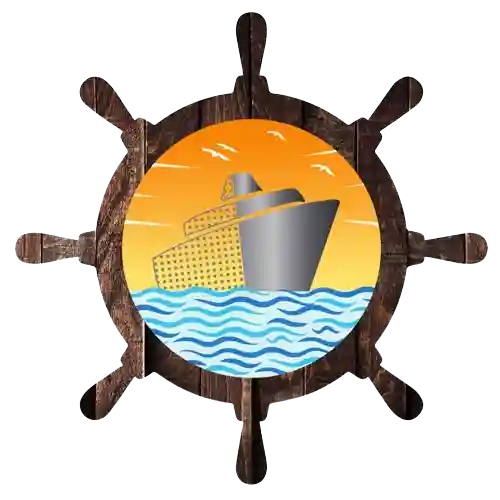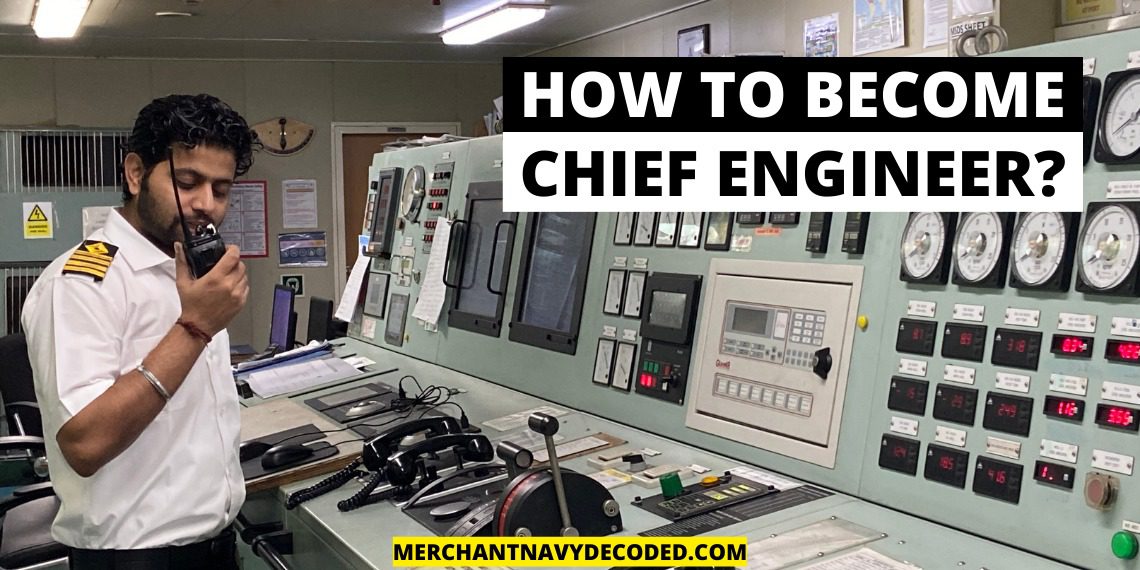How to become Chief Engineer in Merchant Navy
To become a Chief Engineer in the Merchant Navy, one must first complete one of the following courses from formal maritime education and training which is typically obtained through an approved maritime college or maritime academy.

Sea Time Required For MEO Class IV

The required sea time for different types of ships is as follows for MEO Class IV.
- Motor ship: -minimum of 6 months (183 days)
- Steam ship: -A minimum of 6 months (183 days)
- A Combined Steam and Motor: -minimum 8 months (4 months on motor +4 months on Steam)
On the other hand, steamships are the one that runs using steam-powered engines.
- The propulsion time required for motor ships and steamships is a minimum of 4 months (121 days)
- The propulsion time required for combined steam and motor is 6 months (3 motor+ 3steam months)
COURSES: –These are the refresher courses each candidate is required before joining MEO class IV exams: –
- MFA (MEDICAL FIRST AID)
- AFF (ADVANCED FIRE FIGHTING)
- ENGINE ROOM SIMULATOR
- PSCRB (PROFICIENCY IN SURVIVAL CRAFT AND RESCUE BOAT)
After completing the sea time of engine cadet candidates should do a refresher course and then prepare for the MEO class IV exams:
WRITTEN: – Written exams consists of the 6 papers
- Marine Engineering Knowledge General
- Marine Engineering Knowledge: Motor
- Ship Safety & Environmental Protection
- Marine Engineering Practice
- Ship Construction and stability
- Marine Electro technology
The Total marks of the paper are 100 marks out of which 50% is required.
The candidates who clear the written exams appear for the oral’s exams
Oral Exams: -There are total 4 papers in the orals
- Function 3: – Controlling Operations of ships & care for persons on board at the operational level (COSCPOOL)
- Function 4: – Marine Engineering at Operational Level (MEOL)
- Function 5: -Electronics and Control Engineering at Operational Level (EECEOL)
- Function 6: – Maintenance & Repair at Operational Level (MROL)
The passing marks for orals are 60%
Once you clear oral exams, you’ll be getting a waiting period as per the companies’ terms and conditions. Some companies make Jr.4EO for newly MEO CLASS IV COC holders, companies are promoted to 4th Engineer only after 6 months of successful Jr. Engineer on a ship.
4th Engineer to 3rd Engineer

- To become a 3rd Engineer, you need to gain enough experience working as a 4th Engineer on board different types of ships. There are no exams for the promotion to 3rd Engineer. People usually get promoted on getting a good appraisal report from the Chief Engineer. Good companies usually take a long time to give promotions, and sometimes nearly takes 2-3 sails (15-18 months) for promotion.
- To get a good appraisal by your superiors, you need to perform well in your current role as a 4th Engineer. Take on additional responsibilities and duties and demonstrate your skills and competence in managing the ship’s machinery and systems. Perform all the duties like Engine Room watch keeping duties properly and know how to deal in case of machinery breakdown.
Appraisal reports are sent to the company; the company verifies the candidate and then gives the promotion. Remember that promotions in the Merchant Navy are based on your skills, experience, and performance, so it is crucial to work hard, be proactive, and continuously improve your skills to increase your chances of getting promoted.
MEO Class II

To get promoted as a Second Engineer, you must clear MEO Class II exams, and here is all related information.
The following are the requirements for getting an MEO class II COC.
- Candidates must make sure they have completed 12 sea times as 4 EO or 3 EO. Sea time even includes one contract as a junior engineer.
- The minimum propulsion time is 8 months of sea time.
- Min watch keeping on Main propulsion Machinery or UMS duties (on ships 750 kW or more).
Including the above requirements, the given below requirements are compulsory
- 4 Months preparatory course as per STCW 2010.
- Engine Room Simulator course as per STCW 2010.
- All modular courses refresher as per STCW 2010.
- Refresher FPFF
- Refresher PSCRB
- Refresher MFA
- Refresher AFF
- Ship security officer course
Written Papers: –There are 6 papers for MEO class II
- Marine engineering knowledge (General)
- Marine engineering knowledge (Motor)
- Marine Electro technology
- Marine Engineering practice
- Naval Architecture
- Ship Safety, Environmental Protection Care
The total marks for written is of 100 marks out of which 50% is compulsory for passing.
Orals Papers: –There are four papers for MEO CLASS II orals
- FUNCTION 3- Naval Architecture and Safety (Controlling the operation of the ship and caring for persons onboard).
- FUNCTION 4b- Marine Engineering Knowledge (Motor and General).
- FUNCTION 5- Marine Electro Technology
- FUNCTION 6–Marine Engineering Practice.
The total percentage for passing orals is 60 %.
On getting the MEO class II ticket, it is not always necessary that you will be directly sailing as a 2/E, some companies give promotion only after you have 3-6 sailing experience as a 3EO or 4EO. On bulk carriers, you will get a faster promotion as compared to GAS carriers and tankers. On tankers, the company gives you a promotion only after excellent CEO remarks and after the company’s approval. Networking with your colleagues, supervisors, and senior officers can help you to know about any upcoming vacancies or promotions and can also help get recommendations.
To learn complete information about MEO Class II, check out our MEO Class 2 Complete Guide.
MEO Class 1

The MEO Class 1 Exam is a rigorous and challenging examination, and candidates must be well-prepared to pass it. The examination includes written tests, oral exams, and practical assessments, and covers various topics related to marine engineering, ship operations, safety, and management.
To prepare for the MEO Class 1 Exam, candidates should have a good understanding of marine engineering principles and practices, stay updated with the latest industry trends and regulations, and continuously improve their knowledge and skills through training and courses.
To get promoted as Chief Engineer you must clear MEO Class I exams and here is all information related to that.
The following are the requirements for getting an MEO class I COC.
- Candidates must have completed 24 Months of Sea time as an MEO CLASS IV COC and 18 months as MEO CLASS II COC.
- Candidates must have completed 16 Months of propulsion Sea time as MEO CLASS IV COC and 12 months as MEO CLASS II COC.
- Candidates should have sailed on at least 3000 KW propulsion power or more.
Including the above requirements, the given below requirements are compulsory
1). Engineering Management Course.
2). Machinery Space Simulator Training.
3). All Refresher courses if expired.
- There is only one Written and oral exam required for clearing the MEO CLASS I examination I.e., Engineering at the Management level
- Written in the same as per IMU but orals are sometimes on the fate and the examiner’s mood and sometimes on the caliber and knowledge of the candidate. Most candidates get stuck in the orals for the above-mentioned factors.
- Seafarers prefer Kandla, Kolkata, and Mumbai as the success rate is high there but people rarely go for Delhi, as the surveyors are very strict, and even if the person has superb preparation they get out.
CHIEF ENGINEER is the highest rank in the ship from the engine background.
To get the complete information about MEO Class 1, CLICK HERE.
This is how you finally become Chief Engineer.
Some extra brilliant candidates do EXTRA FIRST CLASS ENGINEERS, who want to become Surveyors like MMD Surveyor CLASS IV and CLASS II ORALS surveyors etc.
Disclaimer :- The opinions expressed in this article belong solely to the author and may not necessarily reflect those of Merchant Navy Decoded. We cannot guarantee the accuracy of the information provided and disclaim any responsibility for it. Data and visuals used are sourced from publicly available information and may not be authenticated by any regulatory body. Reviews and comments appearing on our blogs represent the opinions of individuals and do not necessarily reflect the views of Merchant Navy Decoded. We are not responsible for any loss or damage resulting from reliance on these reviews or comments.
Reproduction, copying, sharing, or use of the article or images in any form is strictly prohibited without prior permission from both the author and Merchant Navy Decoded.


